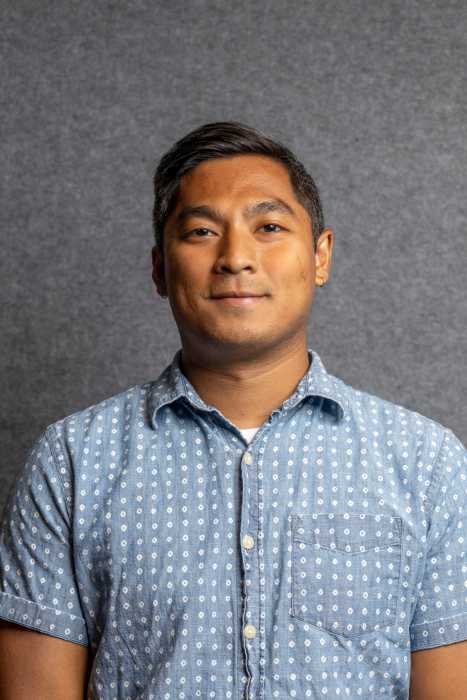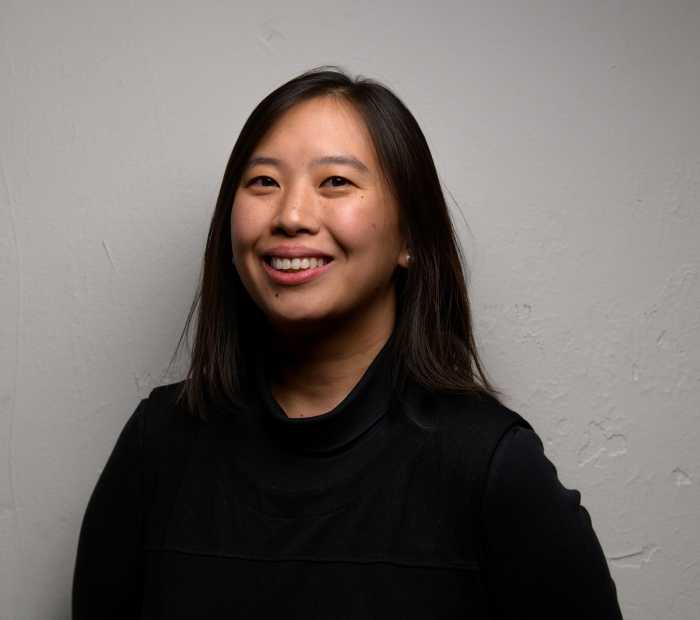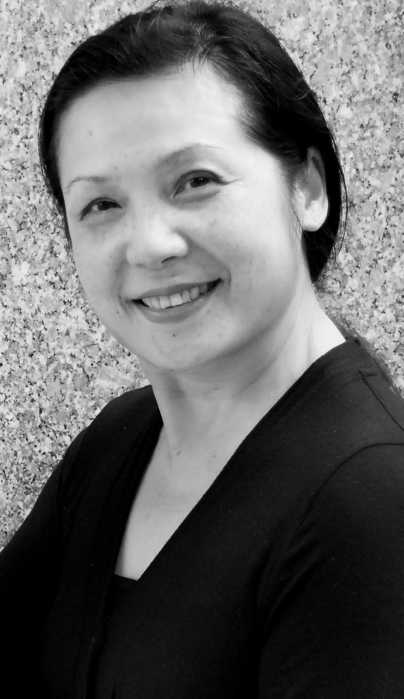Cecilia Moy Yep is known as “The Godmother of Chinatown” in Philadelphia and has fought major developments in Chinatown, now home to about 8,000 residents, for more than 60 years, since opposing the original plan for the Vine Street Expressway which cut straight through her home and required demolishing Holy Redeemer Catholic Church and school. Since then, Yep has protected Chinatown from infrastructure projects that threaten to further carve up the neighborhood. She has lived in Chinatown since she moved there with her family when she was eight years old.

Raksmeymony ‘Rex’ Yin
Executive Chair, Asian Mosaic Fund and Operations and Organization Lead, Philadelphia Asian & Queer

Raksmeymony ‘Rex’ Yin is a 1.5-generation Cambodian American queer educator passionate about education equity, social equality and community healing. He approaches his work with a critical consciousness of his personal history, community narratives, intersectionality framework, and ecological systems theory. Rex aspires to improve the quality of life of marginalized, vulnerable populations and contribute to systemic changes that have a long-term positive impact. He is a Philadelphia native and serves in numerous community organizations.
If you could give your younger-self advice, what would it be?
Lean into uncertainty, trust the process, and embrace the personal journey.
Do you have any event/movie/music suggestions for our readers to check out in celebration of AAPI Heritage Month?
Book Recommendations: “How to Pronounce Knife: Stories” by Souvankham Thammavongsa, “On Earth We’re Briefly Gorgeous” by Ocean Vuong and “Afterparties” by Anthony Veasna So
How has your heritage shaped the person you are today?
As a child of Cambodian refugees and immigrants, I am reminded of my family’s journey to and from America. My family could detail their journey through the killing fields of Cambodia and overcoming myriads of cultural and social barriers. My family instilled tremendous pride in our people’s self-determination and perseverance through the most challenging periods of our country’s history. That has driven my academic pursuits, career achievements, and goals for the AAPI community.
What can Philadelphia policymakers do to support the AAPI-community in the short-term? In the long-term?
Philadelphia policymakers can support the AAPI community by understanding that it is a diverse community with complex histories and unique sociocultural experiences that impact how they navigate the city daily. I hope we have policies informed by cultural responsiveness, trauma-informed practices and strength-based approaches. The AAPI community possesses many assets that deserve opportunities to be elevated and be a greater contributor to the city of Philadelphia.

Jingyao Yu
Program Manager for Community Engagement, Resolve Philly

Jingyao Yu is the program manager for community engagement at Resolve Philly and is passionate about elevating community voices and narratives. Jingyao worked in immigrant-serving nonprofits prior to entering journalism. Outside of Resolve Philly, she served as a past president of the Asian American Journalists Association, Philadelphia chapter. Jingyao also has experience doing philanthropy-adjacent work, having co-led the Greater Philadelphia’s Asian American/Pacific Islander giving circle, Asian Mosaic Fund.

Hua Hua Zhang
President and Artistic Director, Visual Expressions

Hua Hua Zhang was born in Beijing, China, earned an MFA in puppet art in the School of Fine Arts at University of Connecticut. She is founder and artistic director of Visual Expressions. The company has created original contemporary puppet art shows that cross cultures and employ a variety of art forms such as: “Tian Wen – Heavenly Questions for Modern Times,” “White Night,” “Dream of Land,” and “Butterfly Dreams”. For more information please visit this website.
If you could give your younger-self advice, what would it be?
Discovery yourself early: what you like to do and what you desire to be. Don’t be tempted by the outside world. Follow your intuition. Let what is inside you – your internal desires – drive what you want to be. Keep a tight hold on your dreams and move forward toward them!
Do you have any event/movie/music suggestions for our readers to check out in celebration of AAPI Heritage Month?
I suggest people go see a new exhibition Dream House: Inside Music + Video at Asian Arts Initiative. Address: 1219 Vine Street Philadelphia, PA 19107
How has your heritage shaped the person you are today?
I am so proud of the Chinese puppet cultural heritage that flows in my blood and gives roots and shape to my art creations. The traditions of Chinese puppet cultural and artistic heritage are the foundation that I build from to create contemporary puppet art. I cherish this very much. Over the years, I have been trying to create contemporary puppet art for today’s audiences. I want my art to help audiences question social phenomena of today. I constantly experiment with the Chinese puppet performance skills handed down from generation to generation, and with the stylized Chinese traditional performance form, by integrating multi-art forms and video technology. My experiments produce unique artistic effects that gain the interest of today’s audiences and keep the artistic creation window wide open for me to explore infinite possibilities.
What can Philadelphia policymakers do to support the AAPI-community in the short-term? In the long-term?
In the long-term, Philadelphia policymakers can keep in mind that AAPI artists need to have basic salary and health insurance to support our living. Policymakers can show they value AAPI artists by including our voices so we can be heard. One good way to support AAPI artists in the short term is to have more arts education funding for AAPI artists working in schools. AAPI children need to see that their culture is important and valued and children who are not AAPI need to have the chance to learn about our culture to appreciate and understand the AAPI community and our traditions better.

Mary Zhou
Artist and Communications Manager, Painted Bride

Mary Zhou (they/she) is a Chinese American poet and movement artist based in Philadelphia, and communications manager for arts nonprofit Painted Bride. They are an alumnus of the VONA/Voices residency for writers of color. Mary also leads community writing workshops for Blue Stoop and Main Line Art Center. Their creative work has been nominated for the Pushcart Prize, and is shared in The Rumpus, Foglifter, Oversound, and ANMLY.
If you could give your younger-self advice, what would it be?
When we were teenagers, my friends and I had our fortunes read together for fun. The reader said my life would be the most full of unknowns, but that this wasn’t a bad thing. It was true – the life I have now as a queer Asian American artist would be unimaginable to my younger-self. I’m still learning to embrace uncertainty, so this is really advice for any of my selves.
Do you have any event/movie/music suggestions for our readers to check out in celebration of AAPI Heritage Month?
“How to Write an Autobiographical Novel” by Alexander Chee is a regular re-read for guiding questions: What’s it like to be queer, Asian American, a writer, and an activist? What stories do you need to tell? “Soft Science” by Franny Choi was my introduction to queer Asian American poetics. I’d never seen poetry like that before – cyborgs, diaspora, femininity, rage, and all their intersections – and it made me hungry for more.
How has your heritage shaped the person you are today?
The split-consciousness of being Asian American has granted me both many ways to belong and many ways to feel alienated. This, and being queer, have made community, art, and creativity deeply necessary in my life. We need and deserve expression, witness, and celebration for our rage, our grief, and our beauty.
What can Philadelphia policymakers do to support the AAPI-community in the short-term? In the long-term?
Save Chinatown and oppose the construction scheme for the new 76ers Arena. Fund Philadelphia arts and culture without budget cuts. Protect reproductive rights and access to gender-affirming care. Ensure that health and social services are available with cultural humility and accessible language to our community members who don’t use English as a first language. Last but definitely not least, support an immediate and permanent ceasefire for Palestine – all of our liberations are intertwined.






